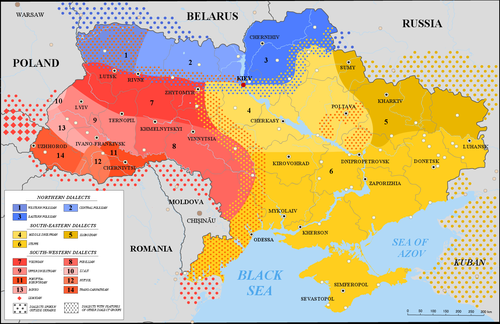Podolian dialect
Podolian or Podillian dialect (Ukrainian: Подільський говір) is a dialect of Ukrainian language spoken in the historical region of Podolia (Ukrainian: Поділля, Podillia) in central-western areas of Ukraine. It is usually classified as part of Southwestern Ukrainian dialects and is the easternmost dialect in the group.

History
[edit]Podolian dialect formed in the historical lands of the Rus' Principality of Terebovlia and the latter Podolian and Bratslav Voivodeships of the Polish-Lithuanian Commonwealth. Main features of the dialect were first described by Ivan Vahylevych in 1845.[1]
Area
[edit]The territory where Podolian dialect is spoken covers the southern parts of Khmelnytskyi and Vinnytsia regions, western parts of Cherkasy, Kirovohrad and Mykolaiv regions, as well as northern parts of Odesa region. This area borders Southwestern Ukrainian dialects (Dniestrian, Pokuttia-Bukovynian and Volhynian), as well as Southeastern Ukrainian dialects (Middle Dnieper and Steppe dialects).[2]
Main features
[edit]Phonetics
[edit]- merger of vowels [e], [ɪ] and [o], [ʊ] in an unstressed position: силó [seˈɫɔ], шерóкий [ʃeˈrɔkei̯], туб’í [tʊˈbʲi], дуп’íк [dʊˈpʲik];
- lack of transition of [a] into [ɛ], [i] after palatalized consonants (except western varieties);
- lack of palatalization in [r] before vowels: бурáк [bʊˈrak], радóк [rɐˈdɔk], расни́й [rɐsˈnɪi̯], зорá [zoˈra], говóру [ɦoˈwɔrʊ] (standard Ukrainian pronunciation - буряк [bʊˈrʲak], рядок [rʲɐˈdɔk], рясний [rʲɐsˈnɪi̯], зоря [zoˈrʲa], говорю [ɦoˈwɔrʲʊ]);
- in southern varieties: lack of palatalization in word-final [t͡s]: хлопец [ˈxɫɔpet͡s], місяц [mʲisʲɐt͡s] (standard Ukrainian - хлопець [ˈxɫɔpet͡sʲ], місяць [ˈmʲisʲɐt͡sʲ]);
- lack of palatalization in [t], [d], [n], [s], [z], [l] before [i] that stems from etymological [o]: ніс [nis], сік [sik], стіл [stiɫ], лій [lij] (standard Ukrainian [nʲis], [sʲik], [sʲtʲiɫ], [lʲij]);
- insertion of [lʲ], [nʲ] after labial consonants: рипл’áх [repˈlʲax], здорóўл’а [zdoˈrɔʊ̃lʲɐ], мн’áсо [ˈmnʲasɔ] (standard Ukrainian репʼях [repˈjax], здоровʼя [zdɔˈrɔʊ̃jɐ], мʼясо [ˈmjasɔ]);
- transition of [v] into [m] in -vn-: рíмний [ˈrimnei̯], дамнó [dɐmˈnɔ] (standard Ukrainian рівний [ˈrʲiʊ̃nei̯], давно [dɐʊ̃ˈnɔ]);
- insertion of consonants [w], [ɦ] before word-initial vowels: госінь [ˈɦɔsʲinʲ], восінь [ˈwɔsʲinʲ], горати [ɦoˈrate], ворати [woˈrate];
- lack of gemination in consonants: нас’íн’а, кор’íн’а, жит’á;
- lack of palatalization of word-final [t] in verbs: рóбит, нóсит, рóбл’ат, нóс’ат, роб’íт, нос’íт;
- lack of dental consonant transition into sibilants in verb forms: хóд’у, нóс’у, крýт’у, вóд’у.[3]
Morphology
[edit]- lack of differentiation between "soft" and "hard" stems in declination of nouns: кон’óв’і, товáришов’і, кон’óм, товáришом, земл’óйу, долóн’ойу, грýшойу, пóлʼом;
- in western varieties endings of feminine single nouns in instrumental case have the form -еў or -оў, -ом: землéў, душéў, земл’óў, душóў, земл’óм, душóм;
- in southern varieties single nouns of 3rd declension in genitive have the ending -и: сóли, смéрти; certain nouns in locative case have the ending -ох: у с’íн’ох, у грýд’ох;
- shortening of feminine adjective and possessive pronouns in dative and locative cases: зелéн’і трав’í, на зелéн’і трав’í;
- lack of differentiation between "soft" and "hard" word stems in adjectives: си́ний, дáвний;
- usage of suffix -ішч for creation of comparative forms: добр’íшчий, син’íшчий;
- presence of analytical and synthetic future forms: роби́тиму, бýду роби́ти і бýду роби́ў;
- in western varieties: widespread use of complex past verb forms (роби́лис-мо, роби́лис-те); use of particle ся in pre-word position (де ся ти дíла).[4]
Lexical features
[edit]

| Podolian dialect | Standard Ukrainian | English | Notes |
|---|---|---|---|
| най (nay) | хай, нехай (khay, nekhay) | "let it be" | |
| когут (kohut) | півень (piven') | rooster | |
| рішча (rishcha) | хмиз (khmyz) | brashwood | |
| комарі (komari) | мурашки (murashky) | small insects, ants | in standard Ukrainian the word комарі is used in the meaning "mosquitoes" |
| заводять (zavod'at') | виють (vyyut') | (they) howl | used in respect to wolves |
| чорногуз (chornohuz) | лелека (leleka) | stork | |
| шматок (shmatok) | кусок (kusok) | piece | |
| папйоша (papyosha) | кукурудза (kukurudza) | maize | from Romanian |
| бурдей (burdey) | землянка (zemlyanka) | pit-house | from Romanian |
| баюра (bayura) | калюжа (kalyuzha) | puddle | |
| варцаба (vartsaba) | одвірок (odvirok) | doorpost | from Polish[7] |
In literature
[edit]Podolian dialect is used in works of Ukrainian authors such as Marko Vovchok, Anatoli Svydnytsky, Stepan Rudansky, Mykhailo Kotsiubynsky, as well as in ethnographic collections by Mykhailo Maksymovych and Pavlo Chubynsky.[8]
References
[edit]- ^ "Подільський говір". Encyclopedia of modern Ukraine (in Ukrainian). 12 December 2023. Retrieved 2025-04-14.
- ^ "Подільський говір" (in Ukrainian). Retrieved 2025-04-14.
- ^ "Подільський говір" (in Ukrainian). Retrieved 2025-04-14.
- ^ "Подільський говір" (in Ukrainian). Retrieved 2025-04-14.
- ^ "Подільський говір" (in Ukrainian). Retrieved 2025-04-14.
- ^ "Подільський говір". Encyclopedia of modern Ukraine (in Ukrainian). 12 December 2023. Retrieved 2025-04-14.
- ^ "Варцаба - етимологія" (in Ukrainian). Retrieved 2025-04-14.
- ^ "Подільський говір". Encyclopedia of modern Ukraine (in Ukrainian). 12 December 2023. Retrieved 2025-04-14.
This article needs additional or more specific categories. (May 2025) |
